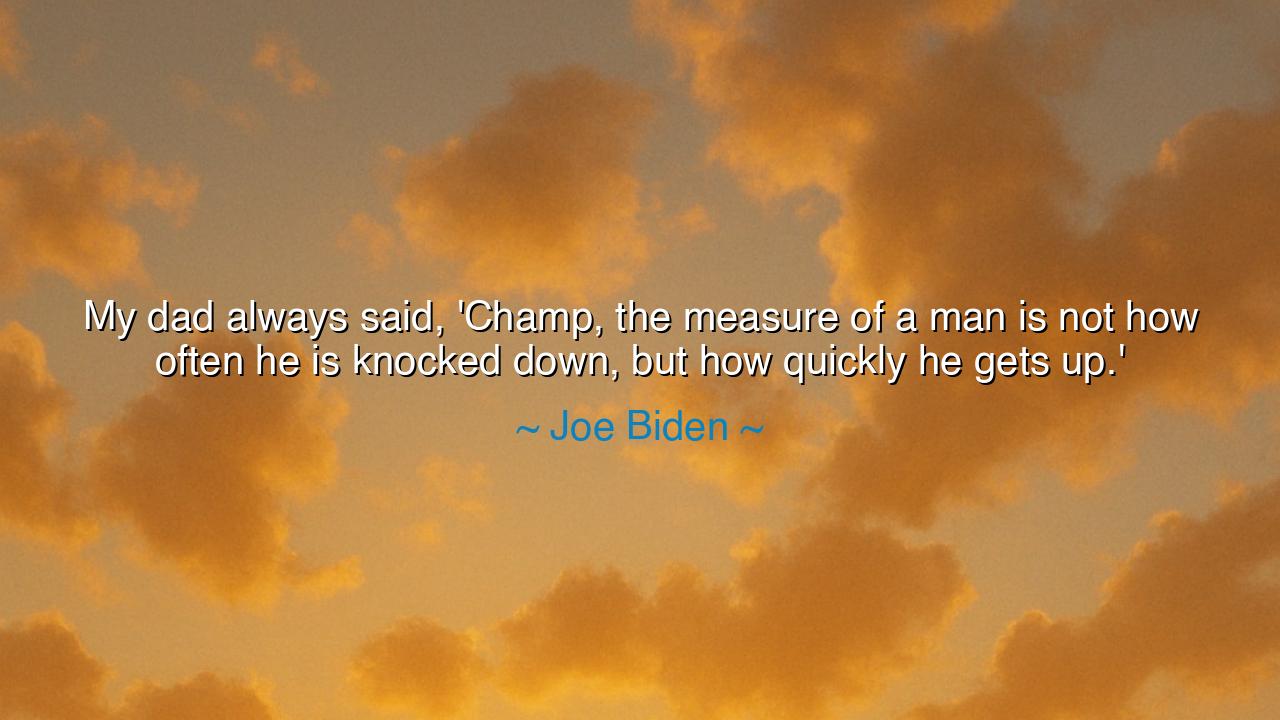
My dad always said, 'Champ, the measure of a man is not how often
My dad always said, 'Champ, the measure of a man is not how often he is knocked down, but how quickly he gets up.'






When Joe Biden said, “My dad always said, ‘Champ, the measure of a man is not how often he is knocked down, but how quickly he gets up,’” he was not merely recalling the words of a father—he was invoking an ancient truth about resilience, character, and the indomitable power of the human spirit. His father’s wisdom, simple yet profound, reflects a law as old as life itself: that strength is not the absence of failure, but the courage to rise after it. These words carry the fire of endurance, the call to stand once more in the face of hardship, and the quiet dignity of those who refuse to surrender to despair. It is a lesson spoken in the humble tongue of a parent, yet it resounds like the voice of eternity.
The origin of this quote lies in Biden’s own life, woven deeply into his journey of triumph and tragedy. His father, Joseph R. Biden Sr., was a man of modest means who knew the weight of struggle. Having faced financial ruin and loss, he understood that a person’s worth is tested not in comfort, but in adversity. From him, young Joe learned that every fall—whether of fortune, health, or hope—is an invitation to prove one’s spirit. Those words, “how quickly he gets up,” would follow Biden through the storms of his own life: the devastating car accident that took his wife and daughter, the political defeats that humbled him, the personal losses that might have broken a lesser heart. Yet each time, he rose. And in rising, he fulfilled the creed his father had planted in his soul.
This teaching belongs not to one man or one family alone; it is the heritage of humanity. Since the dawn of civilization, every culture has honored those who rise after the fall. The Japanese speak of it as “Nana korobi ya oki”—“fall down seven times, get up eight.” The ancient Greeks saw it in the story of Heracles, who endured twelve impossible labors to prove the endurance of the human will. Even the Bible tells of Job, who, though stripped of all earthly blessings, refused to curse his Creator and instead found strength in faith. Across ages and tongues, the lesson remains the same: to fall is human; to rise again is divine.
Consider the story of Abraham Lincoln, who embodies this truth in every line of his life. Before he became the great liberator and President of the United States, Lincoln knew defeat more than success. He lost elections, failed in business, and suffered unspeakable personal sorrow. Yet he kept rising, kept fighting, kept believing. When the nation itself was knocked to its knees by civil war, it was Lincoln’s steadfast spirit—his refusal to stay down—that guided it toward unity. His life, like Biden’s father’s words, reminds us that the measure of greatness lies not in never falling, but in always standing again with purpose.
The wisdom of “how quickly he gets up” speaks not only to perseverance but to timing—to the urgency of hope. To rise quickly is to deny despair its hold, to strike before defeat becomes identity. Many fall and linger in the dust, paralyzed by shame or sorrow. But the one who rises swiftly transforms the fall itself into motion—a kind of rebirth through struggle. As the Roman philosopher Seneca wrote, “Every new beginning comes from some other beginning’s end.” To rise quickly, then, is to refuse the illusion of finality, to declare that every ending is simply the start of another climb.
Yet, this wisdom is not easy to live. It demands courage when the heart is weary, faith when the way ahead is unclear, and humility to accept that falling is part of the human journey. But those who practice it—who learn to rise again and again—grow stronger with each ascent. Like a blacksmith’s blade, their spirit is tempered by every blow. They become examples to others, living proofs that resilience is the highest form of grace. Biden himself, having faced deep grief and loss, carries this truth not as theory but as lived experience. His father’s words, spoken decades ago, became the anchor that held him fast through every storm.
So, my children of the present age, take this teaching to heart: you will be knocked down. Life, in its infinite complexity, will humble you again and again. But your worth will never be measured by the fall—it will be measured by the rise. Do not dwell long in the dust. Let your failures be your teachers, your pain your sculptor, your perseverance your crown. Rise swiftly—not in anger, but in purpose; not to prove others wrong, but to prove your own heart right. For as Joe Biden’s father wisely taught, the measure of a person is not found in their ease, but in their endurance. And when you stand once more after the fall, the heavens themselves will bear witness: here stands one who has learned the ancient art of rising.






AAdministratorAdministrator
Welcome, honored guests. Please leave a comment, we will respond soon